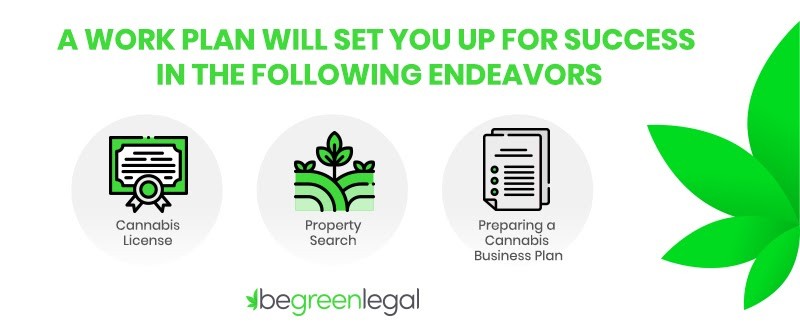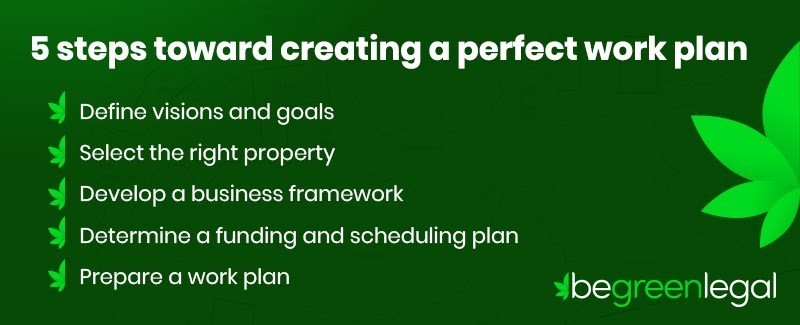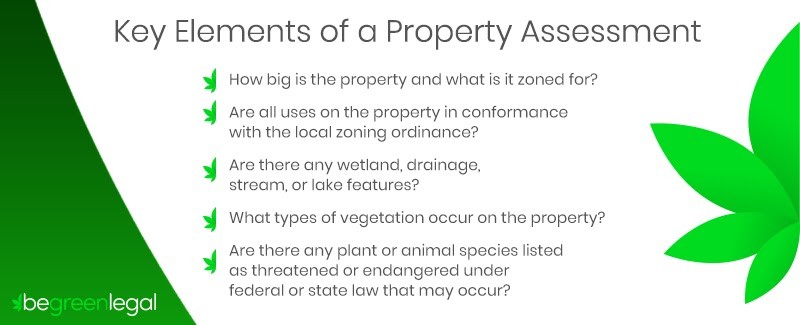Every entrepreneur needs a solid work plan before diving in headfirst, and cannabis businesses are no exception.
Unfortunately, a lot of novice cannabis entrepreneurs jump the gun and overlook this critical step.
Not locking down a detailed work plan can lead to…
- Tens of thousands, if not hundreds of thousands, in financial loss
- Months, and even years, of delays
- Headaches galore
Of course, the worst case scenario is that you run out of funding before major problems can be solved.
This is a real risk, and it’s why you need a thorough work plan to determine what it is you need and when you need it.
Each assessment is unique to every business.
You have it to figure out how much everything is going to cost, including the licensing process, which is always the most important piece of the puzzle.
Fortunately, these details can all get sorted out during an initial discovery period, but more on that later…
For now, let’s dig a little deeper into what a work plan is and why it’s so essential.
Then we’ll cover how to create a winning work plan.
Let’s get started!
What Is a Work Plan?
A work plan is an effective to-do list that helps you determine what types of licences you need, select a property, and create a detailed business plan.
In a nutshell, it’s a master outline for the success of your business.
Inevitably, there’ll be hidden obstacles along the way, but a winning work plan can help you mitigate them.
Why a Work Plan Is the Foundational First Step
Why is a work plan so important?
Let me ask you this:
Would you ever prep for a 300-person dinner without a shopping list?
Hopefully not!
The same goes for the marijuana industry…
If you want to start a cannabis business, you have to do your due diligence in order to achieve your vision and goals.
How Critical Are Permits and Licenses?
If you’re like most of our clients, you probably have a few questions about licensing, and for good reason…
Permits and licenses are the core focus of any work plan.
Licensing can make or break your business, and sadly, a lot of new entrepreneurs get tripped-up here from the start.
That’s why we’ve put together a free eBook that answers all the most common questions regarding permitting and licensing.
It addresses essential topics like:
- What steps you need to take
- How we can help you take them
- Common pitfalls
Obtaining the right licenses will pave the way for maximum growth without having to look over your shoulder for regulatory infractions.
But depending on the city, county and state where you’re located, this part can be a tad complicated.
Here are the super-basic steps to getting licensed:
- Entity Formation (Incorporation, Employer ID, Seller’s Permit, Business License)
- Local Approval (Use Permits, Building Permits, Grading Permits, Operator Permits)
- State License (Cultivation, Manufacturing, Testing, Distribution, Retail, Microbusiness)
- Environmental Approval (Water Discharge Permits, 1602 Agreements, Toxic Substances Reporting, Environment Review)
To obtain these licenses, you may have to deal with any number of the following agencies:
- Department of Fish and Wildlife
- Water and Resources Control Board
- Department of Pesticide Regulation
- Bureau of Cannabis Control in the Department of Consumer Affairs (DCA)
- Department of Food and Agriculture (DFA)
- Department of Public Health (DPH)
- Bureau of Cannabis Control (BCC)
- Department of Industrial Relations
- Department of Tax and Fee Administration
- Department of Insurance
Their policies are designed to increase public safety, protect public health, protect property rights, and protect the environment, and they’re constantly evolving.
What If You Already Have a Cannabis License?
There are two streams of consciousness whenever we’re advising a new cannabis business:
- You either already have a license
- Or you still need a license
If you already have a license but you don’t know what to do next, you probably have a lot more on your to-do list than you realize.
At the same time, if you still need a license and aren’t sure where to begin, your to-do list becomes even more pressing.
Either way, it’s critical to come up with a needs assessment ASAP, which can easily take a week or two of discovery questions to complete.
5 Steps to Creating the Perfect Work Plan
It’s time to cover the critical elements of a winning work plan that every cannabis business needs.
These are the tasks to obtain your permits and licenses and to give your business a clear direction.
Further down the road, your work plan will evolve into a full-fledged business plan with detailed actionable steps.
In fact, you might already have some of these elements in place, such as forming an entity or finding a property.
Here are the five steps of a perfect work plan:
- Define visions and goals
- Select the right property
- Develop a business framework
- Determine a funding and scheduling plan
- Prepare a work plan
Now let’s take a closer look at how you can create a work plan that will set your cannabis business up for success.
Step #1: Define Your Visions and Goals
What do you want to accomplish with your business and in what timeframe?
Even if you’ve run successful businesses in the past, the cannabis industry is an entirely different animal.
Whether you’re going into retail, distribution, manufacturing, or cultivation, understanding how your business works will shape your goals to be SMART:
- Specific
- Measurable
- Attainable
- Realistic
- Time-Frame
The amount of time it takes to tackle issues like property, marketing and operations, and legal and tax compliance can be shocking, which is why it’s important to have realistic ideas for how long it’s going to take to reach each milestone.
Step #2: Select the Right Property
Whether you’re still on the hunt for a viable property or already have a location, understanding the intricacies of your property and how it gels with your business goals is critical.
For example, unexpected environmental features can lead to long delays if you aren’t prepared.
That’s why we advise all our clients to undergo a thorough property and environmental assessment to make sure they have accurate answers to all the critical questions, like:
- How big is the property and what is it zoned for?
- Are all uses on the property in conformance with the local zoning ordinance?
- Are there any wetland, drainage, stream, or lake features?
- What types of vegetation occur on the property?
- Are there any plant or animal species listed as threatened or endangered under federal or state law that may occur?
Once you have answers to these important questions, you can develop a business framework and start figuring out which permits and licenses you’ll need…
Step #3: Develop a Business Framework
After you define your business goals and find a property that aligns with what you’re trying to do, you’ll be ready to develop a business framework.
Your business framework determines which licenses you’ll need.
If you want to appease your local and state regulators, you’ll need to make sure that your property aligns with the following permits:
- Land Use Permits
- Environmental Permits
- Building and Grading Permits
- Business Operations Permits
These licenses dictate every aspect of the business plan that you’ll create later on, including workflow, facilities, financial metrics and analyzing market factors.
Step #4: Determine a Funding and Scheduling Plan
The next essential step is to determine a funding and scheduling plan.
At this point, you should know exactly what you need to do, and all that’ll be left is to make sure you have the funding in place.
Step #5: Pull It All Together Into a Comprehensive Work Plan
By now, you should have a master checklist built around the local and state regulations that govern the marijuana industry.
You should also have a solid grasp on how these regulations mesh with your vision and goals, property operations, environmental factors, and more.
Eventually, you’ll use your work plan to create a detailed business plan, which will consist of actionable steps that cover all the nitty gritty details, such as legal and tax compliance, entity structure, and everything in between.
The Risks of Not Putting Together a Work Plan
A work plan is important for budgeting, scheduling, and most of all, acquiring licenses and staying in compliance with regulators.
Some people go to lease a building but they don’t even know if the building will be approved.
What people don’t realize is that there are a lot more details that go into the state licensing process.
You need a floor plan, a design plan, and if you have to pay a lease payment for a year, you have to know that you have the necessary funding.
We’ve seen projects where clients originally had easy startup costs, only to find that the county fee was a minimum of $12k just to submit the application.
This type of scenario plays out time and time again to unsuspecting entrepreneurs, then they get frustrated because funds are running low and the clock is ticking.
However, situations like these can usually be avoided with a detailed work plan.
Need Help Putting Together a Winning Work Plan?
It’s on you to put together an assessment for your cannabis business.
The question is what sort of expertise do you need and where can you find it?
With the right due diligence and a ton of research, it’s possible to create a winning work plan on your own.
However, the stakes are high and errors can be costly.
If you’d rather consult an expert, our consultants have been guiding cannabis entrepreneurs for years.
They look at each business from the ground up with up-to-date knowledge on environmental codes and cannabis legislation.
If you’ve already settled on a niche and have a viable piece of property, we can go from there, or if you’re starting from scratch, we’re happy to complete a comprehensive Opportunity Assessment for you.
Schedule a 90 minute consultation with one of our expert cannabis consultants and we will give you key insights about:
- Application and licensing process
- Available license types and business models
- Financial expectations
- Funding options
We’ll help you fast track your cannabis education and get your specific questions answered.










